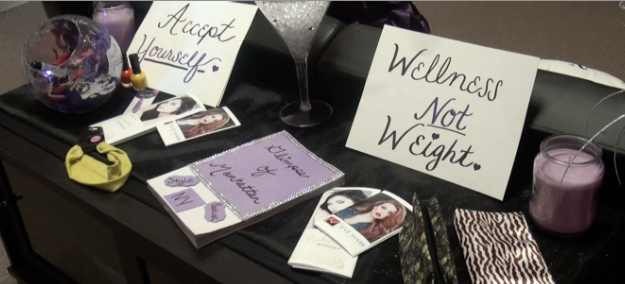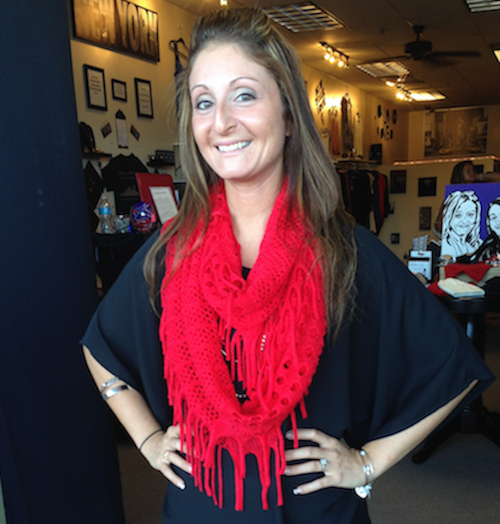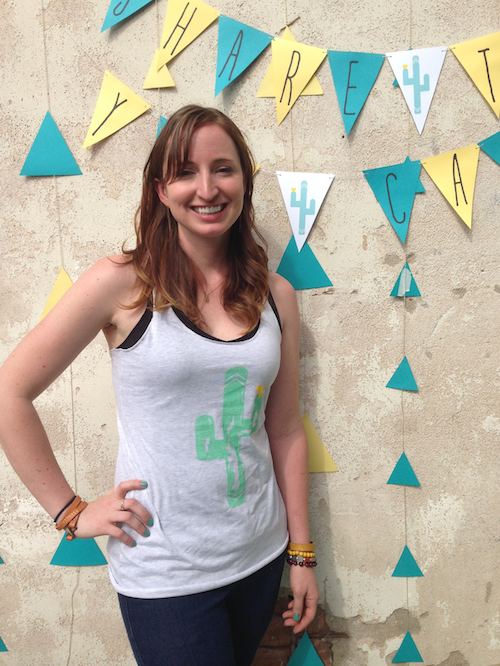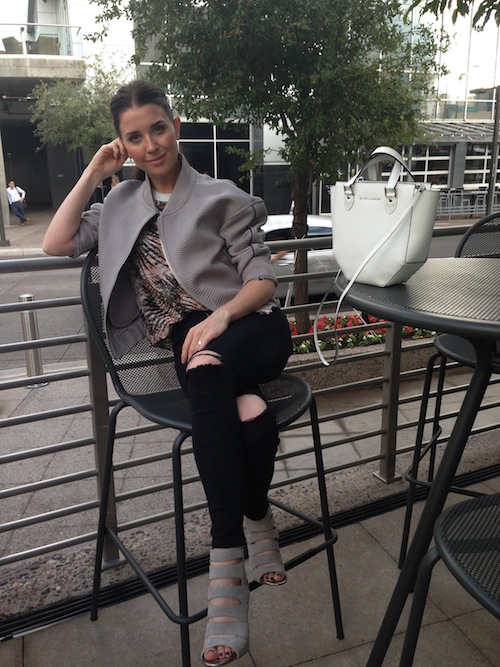
- Story by Tamara Kraus
Jaye Dubbiosi was in grade school when her mom fast-food hopped from McDonald’s to Chinese takeout to Burger King. Then she threw it all up.
It’s been more than two years since her mom died at 51 from multiple eating disorders and two years since she moved from New Jersey to Arizona. Now, it’s a Friday night in Dubiossi’s clothing store, Glimpse of Manhattan. Two years ago, she opened the store so women can feel comfortable shopping for sizes xs to 3x.
More and more women like her are starting philanthropy-based businesses. They no longer follow the money. They follow a purpose.
They do it to raise awareness for nonprofit organizations. For education. For gender equality. To serve others.
Dubbiosi does it to promote a healthy body image movement.
Tana Nelson, a Phoenix-based branding expert at Your Marketing BFF, works with many purpose-over-profit, or “POP”, businesses like Dubbiosi’s. Nelson says small businesses like Dubbiosi’s have a personal niche no large firm could ever fill. And because women tend to be nurturing, more are taking advantage of this opportunity to raise awareness for certain causes.
“In a competitive industry, something has to set businesses apart, Nelson says. “It’s not just making that thing or whatever it is you’re selling. You’ve got to be a good storyteller.”
Dubbiosi knew her mom’s battle with anorexia, bulimia, diet pills, drugs and alcohol abuse wasn’t rare. Eating disorders are a growing cultural phenomenon and have the highest mortality rate of any psychiatric disease. Over the past five years, 13 percent of women ages 50 and older had symptoms of eating disorders. Seventy percent tried to lose weight and 62 percent felt their weight had a negative impact on their life. This is because our society promotes eating disorders to “solve” the obesity epidemic. But this is backfiring, just like it did with Dubbiosi’s mom.
So in her store Dubbiosi sells T-shirts that support the National Association of Anorexia Nervosa and Associated Disorders, puts on all-size fashion shows and hosts small business events to raise money for the foundation. She plans to host a 5k walk in honor of her mom.
Dubbiosi, 29, is wearing workout clothes and her long brown hair is pulled into a high ponytail. She spent her entire life watching her mom criticize her skeleton-thin body. And that’s why she’s motivated, admittedly obsessive, to maintain her healthy body.
The Jersey girl’s social mission is just as authentic as the way she says “Awesum.” “I don’t want to be the Kardashians and have money everywhere,” she says. “I don’t want to be rolling in the dough.”
And in Phoenix, there’s a growing community of “POP” businesses like Dubbiosi’s. Some have stores, but most get the word out via traveling marketplaces.

The Core of Creativity
Maggie McGrath founded one of those creative marketplaces, called Pineapple Triangle, a shopping event where Arizona artists celebrate their creative businesses with the community while giving back to charity. During the week she works full time in sales, but on the weekends, like today, she expresses a peppier side. She happily walks around in a pineapple-printed T-shirt and sneakers made by designers at the event.
Her company holds these marketplaces a few times a year. Today’s event is called “AZ share that you care,” the company’s second event since it started nine months ago.
It’s a Saturday afternoon and McGrath is walking around the Ice House in downtown Phoenix. Inside are 60 vendors who include boutique owners, clothing designers and jewelry makers who are donating 20 percent of his or her sales to a charity of their choice. For some, this is their full time job. For others like McGrath, this is their second, or even third job. But to her, it doesn’t feel like one.
Together, McGrath and the artists are “welcoming change,” just like the name suggests.
When Mcgrath sat down to brainstorm a name for the company, Christopher Columbus popped in to her mind. So she looked it up on Wikipedia. She found that when Columbus sailed to the Americas more than 500 years ago, people greeted each other with pineapples. Villages placed the fruit on columns and buildings, homes and community gatherings.
“Pineapples are a universal symbol of hospitality and welcoming,” Mcgrath says. “Triangles, also known as a delta, are a symbol of change used in math equations.”
Pineapple Triangle gives businesses the opportunity to share a good story that is stitched, painted or processed into wearable and shareable art.
“They’re all achieving their dreams, she says wiping away tears. “They didn’t go with everyday life.”
For example, Jenn Loyd is the fashion blogger behind Sincerely Jenn and she recently started an accessory line. When when she’s not at a local meet-up, blogging or grabbing lunch with her friend, Your Marketing BFF, she’s most likely picking out a pink lipstick at Sephora.
Loyd, 31, is a fashion “It” girl. She’s wearing a black blazer and jeans, an eye catching statement necklace, and of course, hot pink lipstick. And she’s also a devoted Christian wife and mom who does more than just post her outfit-of-the-day on social media.
At the event, she points to a sign that says “Leigh’s Blankies.” It’s a white baroque frame that sits in a sea of hot pink and Tiffany blue accessories. Her friend makes blankets for children in Africa. On the sign, there’s a description of the nonprofit:
“Leigh Ann Tomkinson was 35 when she was an innocent victim of a car accident on March 6, 2010. She was a light to her family and friends, and touched the lives of many children at the Phoenix Children Hospital where she worked as a nursing supervisor. Because of her light and love for children, we want to make a difference too!”
Loyd is picture perfect inside and out. Whether she’s doing fashion consultations or speaking at local mom groups, she makes it her mission to be a servant to others.
And Loyd isn’t the only one with beauty and brains. These two qualities seem to be inseparable at today’s event.
Kylie Wright is a modern, southern belle from Dallas. At the Ice House, the 28-year-old is standing behind Royal Bowtique’s booth wearing a T-shirt that says “Give Life.” Just three weeks ago, she donated her kidney to her sister with kidney disease.
Through her business, she makes it fashionable to be charitable.
Now, she donates 20% of all sales to Give Life, a nationwide program that educates people about being an organ donor.
Her online Etsy store stemmed from a blog she started, called “Mini Haute Mess.” Her sassy T-shirts, bows and jewelry follow the company’s mission statement: “Life as a mini can be messy, so let’s make it hot.”
She’s done just that. And with a touch of southern hospitality.
Wright started Royal Bowtique because she couldn’t find swoon-worthy, southern-inspired mommy and me looks. She started selling clothes to family and friends. Then more people requested her products.
“My business literally stems from having my kids and being at home, and I always joke around, it’s a result of me trying to be a stay at home mom,” she says. “I didn’t really want to go out and get a job as a mom now, but I couldn’t just stay at home.”
She says the Internet has made it possible for stay at home moms like herself to run businesses. Without social media, she wouldn’t have her business.
But not all women business owners are moms. And some prefer small crowds, yet, manage to reach an international and celebrity-endorsed audience.

Philanthropy Meets Luxury
When Sage Aubrey relocated to Kuala Lumpur, Malaysia for a few years, she came back to Arizona with a business idea to combat “fast-fashion” and gender inequality.
So in 2011 she started a namesake Italian-made handbag line, sold exclusively online. It’s a “one for one” business just like Toms shoes. Just like Toms gives a pair of shoes to a child in need, Sage Aubrey’s handbags come with a registration card that, once activated, donates a backpack to a girl in Africa. She calls the program Generation Sage. It prides itself upon integrity, ethics, humanity, authenticity and quality.
Aubrey has always despised over-consumerism in America. She even says the idea of going to Target “freaks her out.”
Generation Sage is her solution to an international problem.
Before she started Sage Aubrey, she owned a clothing store right next door to Whole Foods at Tatum and Shea. But she had to close her small business after five years when the recession hit. On a day she needed extra motivation, she visited the bookstore and picked up “Half the Sky, Turning Oppression in to Opportunity for Women Worldwide,” by Nicholas Kristof and Sheryl Wuddunn. It was then that she wanted to meet women like the ones in the book and make a change. Her husband just so happened to be relocated to Africa for work soon after.
In Africa, she worked with nonprofits that advocated for global issues like sex trafficking, prostitution, poverty, violence and gender inequality. Her first hand experience in girl’s classrooms inspired her company’s platform: “Accessible Education for Every Girl.”
Aubrey is cool and collected, just like the sleek grey bomber jacket she’s wearing. And her black-and-white leather handbags reflect that simple elegance. The sophisticated bags come in black and white and three styles named “Lordes,” “mini Lordes” and “Nxyx.” She named them after strong mythical women to empower the women wearing them.
And when she speaks about her role in the new age of business, her seriousness resonates through her piercing green eyes. But her playful side comes out through the touch of glitter on the corner of her eyes.
Aubrey’s brand is a visual reflection of herself, just like the other women’s businesses. They visually represent the principles of a new creative culture: cause, community and creativity.
She is the new American woman. Like other local businesswomen, she balances home life and work life-in style, of course. It’s a new concept that would get a pat on the back by both Women’s Wear Daily and Forbes.
“A usually superficial industry is becoming [socially] conscious and relevant,” Aubrey says. “And women are starting this trend. We’re naturally altruistic whether we know it or not. It’s changing the landscape of business.”

